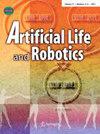利用强化学习和模仿学习开发多智能体对抗环境
IF 0.8
Q4 ROBOTICS
引用次数: 0
摘要
多智能体系统是共享公共环境的自主、交互的智能体的集合。这些实体使用传感器来观察它们的环境,并与环境进行交互。通过强化学习开发合作策略的多智能体系统表现不佳,主要是因为稀疏奖励问题。这项研究进行了一个3D环境,机器人在其中玩沙滩排球游戏。本研究将模仿学习(IL)与强化学习(RL)相结合来解决稀疏奖励问题。结果表明,该方法在Elo评级系统中获得了更高的分数,机器人的性能也优于传统的RL方法。本文章由计算机程序翻译,如有差异,请以英文原文为准。
Developing multi-agent adversarial environment using reinforcement learning and imitation learning
A multi-agent system is a collection of autonomous, interacting agents that share a common environment. These entities observe their environment using sensors and interact with the environment. A multi-agent system that develops cooperative strategies by reinforcement learning does not perform well, mostly because of the sparse reward problem. This study conducts a 3D environment in which robots play the beach volleyball game. This study combines imitation learning (IL) with reinforcement learning (RL) to solve the sparse reward problem. The results show that the proposed approach gets a higher score in the Elo rating system and robots perform better than the conventional RL approach.
求助全文
通过发布文献求助,成功后即可免费获取论文全文。
去求助
来源期刊

Artificial Life and Robotics
ROBOTICS-
CiteScore
2.00
自引率
22.20%
发文量
101
期刊介绍:
Artificial Life and Robotics is an international journal publishing original technical papers and authoritative state-of-the-art reviews on the development of new technologies concerning artificial life and robotics, especially computer-based simulation and hardware for the twenty-first century. This journal covers a broad multidisciplinary field, including areas such as artificial brain research, artificial intelligence, artificial life, artificial living, artificial mind research, brain science, chaos, cognitive science, complexity, computer graphics, evolutionary computations, fuzzy control, genetic algorithms, innovative computations, intelligent control and modelling, micromachines, micro-robot world cup soccer tournament, mobile vehicles, neural networks, neurocomputers, neurocomputing technologies and applications, robotics, robus virtual engineering, and virtual reality. Hardware-oriented submissions are particularly welcome.
Publishing body: International Symposium on Artificial Life and RoboticsEditor-in-Chiei: Hiroshi Tanaka Hatanaka R Apartment 101, Hatanaka 8-7A, Ooaza-Hatanaka, Oita city, Oita, Japan 870-0856 ©International Symposium on Artificial Life and Robotics
 求助内容:
求助内容: 应助结果提醒方式:
应助结果提醒方式:


